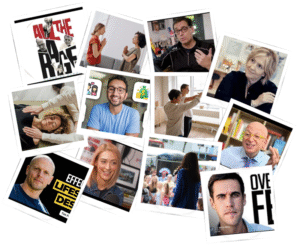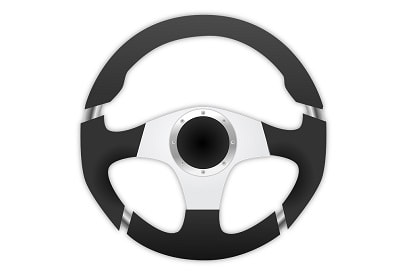If we are struggling to make progress (and positive thinking just doesn’t cut it), we need to consider the idea of radically accepting what is missing in our lives.
Life is pretty hard when we want to change our lives for the better but we just feel like we can’t.
Whatever we seem to do, we keep hitting roadblocks. And as hard as we try, we don’t seem to have what we need to move forward.
We can’t find therapy we can afford. There’s not enough time to spend on things that matter. We don’t have any money to invest in side projects. We don’t have any contacts who can help us get our side businesses off the ground. There aren’t any great opportunities where we live…and on, and on.
Life just seems to present us with continuous obstacles and not much else.
After a while we get trained to spot why things can’t work; why we can’t do what we want to do and why it might be better to give up instead.
When we get into that habitual frame of thinking, we are exhibiting any number of mindsets that make our reality that much harder to bear – whether it is Victim Mentality, Learned Helplessness or Lack Mentality (otherwise known as Scarcity Thinking) — and they are all crippling.
They are particularly insidious because, for many of us, they are simply a default setting.
It doesn’t feel like we are being defeatist. This is just reality.
Stepping out of this kind of thinking, then, can feel like a gargantuan task.
And the antidotes we’re often presented with to help move us out of this state are often rife with issues, too.
The Problem With Positive Thinking
The advice we are often given when we feel trapped by our circumstances is to “dream big”, “think positively” and “visualise success”.
We’re asked to open ourselves up to a world of possibility (that isn’t there), to look on the bright side (regardless of the reality we live in) and to have faith that things will get better (for no apparent reason).
While fantasizing can give us a temporary high, the problem is that deep down we are all too well aware of our realities.
The disparities between what we want and what we have can be enormous, which makes the mental jump so difficult.
Imagining a world of miraculous abundance is a big ask if we live in an environment which is constantly reinforcing the opposite of abundance wherever we look.
So, what do we do then, if we are faced with intractable issues and the future isn’t promising to be any better than the present?
Radical Acceptance
A paradoxical way of freeing ourselves is by completely accepting lack is there and that it might always be there.
It’s called Radical Acceptance.
Radical Acceptance is a therapeutic intervention developed by psychologist Marsha Linehan.
It was intended for sufferers of borderline personality disorder but its principles can be applied universally.
The idea is to take us on the very path we are trying to avoid — the one that leads towards painful realisations of difficult realities.
Instead of pretending things aren’t difficult and wishing things were different, it makes us face the fact that life is not the way we want it to be — period.
Pain & Gain
This is not an intellectual exercise.
Radical Acceptance requires we fully face and 100% accept the harsh truths of the limited worlds we live in (the very worlds we are so desperate to escape).
It is a painful exercise (that’s how we know we are doing it well) – but the pain is short-lived.
The pain comes from fully embracing the unpleasant emotions that arise – anger, grief, abandonment, resentment, heartbreak – from being brutally honest with ourselves.
But the thing with fully feeling our emotions is this: once we do it, we free ourselves from the internal resistance to where we are.
And that – the resistance – is what is actually keeping us stuck.
The Other Side
The Radical Acceptance exercise, once completed, allows us to come out the other side with a new perspective — one that is grounded in reality.
Much like Intense Realism (advocated by Robert Greene), this practice narrows our attention to what we do have at our disposal.
As a result, we give ourselves the potential to become more focused, creative, innovative and resourceful.
We’ll start to look at things differently, for example:
- We can’t find therapy we can afford but we now realise we can look online for people offering heavily discounted therapy services (of which there are many).
- We don’t have enough time to spend on things that matter but we now realise it’s time to cut out certain habits (TV, social media, saying yes to everything) that take up our precious free time. We decide to ruthlessly prioritise ourselves.
- We don’t have any money to invest in side projects but we now look at the free or low cost tools that we have at our disposal and realise there are far more than we previously thought. We cut back on unnecessary expenditure so we have more to spend on what matters.
- We don’t have any contacts who can help us get our side businesses off the ground so we look at what we can do ourselves to get things moving. We join online communities where we can meet people who can offer advice.
- We don’t live anywhere with great opportunities but now we see that as the very fuel we need to focus on launching that side business we might never had done otherwise if “the perfect job” existed on our doorsteps.
Abundant Thinking
True Abundant Thinking is appreciating what we have at our disposal.
It’s realising we have everything we actually need (just not everything we thought we needed).
It is not imagining a world of abundance, where none actually exists.
That is a form of denial which keeps us in resistance to the reality we actually live in.
And left unchecked, that is a far worse pain to be in than the temporary discomfort we experience from radically accepting the limitations of the lives we live.






